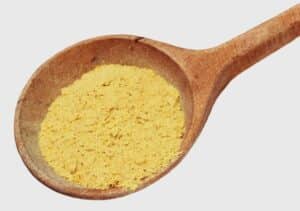 Because nutritional yeast has evolved as a nutritional supplement, it suffers from an unappealing name and a somewhat misunderstood reputation. Nutritional yeast, not to be mistaken with brewer's yeast, is a deactivated yeast that according to Wikipedia, is “produced by culturing the yeast with a mixture of sugarcane and beet molasses, then harvesting, washing, drying and packaging the yeast.”
Because nutritional yeast has evolved as a nutritional supplement, it suffers from an unappealing name and a somewhat misunderstood reputation. Nutritional yeast, not to be mistaken with brewer's yeast, is a deactivated yeast that according to Wikipedia, is “produced by culturing the yeast with a mixture of sugarcane and beet molasses, then harvesting, washing, drying and packaging the yeast.”
As a supplement, it is well known for being a good source of protein and B-complex vitamins. Since vegetarian / vegan diets can be deficient in B12, some like using nutritional yeast for this purpose, but keep in mind that not all brands of nutritional yeast are fortified with vitamin B12.
Yet, even for those of us not seeking its supplementation powers, nutritional yeast should not be underestimated as a flavoring for food …
Nutritional yeast has a relatively strong flavor that is somewhat similar to that pungent taste found in cheese. Like any food, nutritional yeast is loved by many and loathed by others. I personally fall in the middle ground. I do like using it in moderation (usually 1 tablespoon or less per serving) to offer a cheesy boost to certain recipes, without overpowering the entire dish.
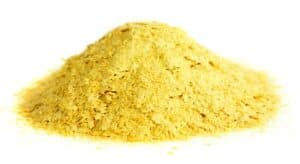 If you're new to nutritional yeast, I do recommend easing in slowly. Big fans of nutritional yeast will use it in great quantity to make recipes like mock mac ‘n cheese. These recipes are usually too much for newbies, and may (unfortunately) turn some people off of nutritional yeast completely. Think of it as a condiment, and start off slowly.
If you're new to nutritional yeast, I do recommend easing in slowly. Big fans of nutritional yeast will use it in great quantity to make recipes like mock mac ‘n cheese. These recipes are usually too much for newbies, and may (unfortunately) turn some people off of nutritional yeast completely. Think of it as a condiment, and start off slowly.
Here are a few ways to use it:
- Sprinkle it over popcorn that has a light coating of olive oil, a sprinkle of salt, and perhaps a bit of chili powder or other seasoning
- Mix it into scrambled eggs, scrambled tofu, or mashed potatoes
- Blend it into a cheese-free pesto
- Stir it into a homemade dairy-free “cream” sauce
- Simmer it in a from-scratch gravy (meat-based or vegetarian)
Also, in my opinion, nutritional yeast is not a standalone flavor. To bring out its cheesy side, some salt (such as sea salt or soy sauce / tamari) always helps, and it does best on a background of other flavors. Parma! Is actually a simple blend that combines nutritional yeast with nuts and salt for more of a ready-to-use format. A similar mix can be made at home using the “Easy Parmesan Substitute” recipe in Go Dairy Free.*
For those who have Go Dairy Free,* I also recommend the Rich & Nutty Ricotta (soy-free), Five Minute Nachos, Tofu Ricotta, Cheesy Potato-Onion Bread, and Orange Cheesy Sauce (great for stove-top mac and “cheese”) as excellent “starter” recipes for nutritional yeast newbies. These recipes are rich in flavor, but use a very modest amount to help ease your taste buds into it. Once you get more adventurous, the Grilled “Cheese” and Cheesy Broccoli Soup recipes are definitely worth a taste.
I usually purchase nutritional yeast in bulk (typically Red Star brand), but have yet to find a big variation in quality or taste between the brands. The easiest nutritional yeast brands to find are Red Star,* NOW,* and Bob’s Red Mill.* In the UK, it is better known as Engevita yeast. Though it can be found in a couple of forms, nutritional yeast is most readily found as flakes. The flakes are what I always use in recipes, and are the type most commonly used among cooks and recipe authors in general. But, if all you can find is the powder, go ahead and use it, it should work equally well.
Locally, look for nutritional yeast in health food stores and in the health food aisles of major grocers. It may be lurking in the bulk foods section (allowing you to purchase just a bit for sampling) and/or packaged on the shelves. If you can’t find it in stores, it is easy to pick up online,* where it is usually competitively priced. Keep in mind, the price of nutritional yeast may seem high at first glance (can range from $9 to $20 per lb in my experience), but it is very lightweight, so you get quite a bit per pound, and as mentioned, a little often goes a long ways.
Keep in mind, no food is an exact replacement for another. Nutritional yeast offers many of the wonderfully bold flavor influences that cheese can offer, but it is not a replica. If you go in with an open mind, and enjoy the flavors of the dish, rather than expecting it to be something it isn’t, you may even find you like it better than the original dairy-filled recipe.
And remember, do use caution as your taste buds adapt to nutritional yeast or if you really like it right out of the shoot. It does contain a good dose of those B vitamins, so try not to go overboard. A serving is often noted as 1-½ to 2 tablespoons.
Alisa Fleming is the author of Go Dairy Free.* Visit her web site, Go Dairy Free for a vast array of information and recipes.
- For more tips on plant-based nutrition, make sure to browse VegKitchen’s Nutrition page.
- For lots more features on healthy lifestyle, please explore VegKitchen’s Healthy Vegan Kitchen page.
*This post contains affiliate links. If the product is purchased by linking through this review, VegKitchen receives a modest commission, which helps maintain our site and helps it to continue growing!



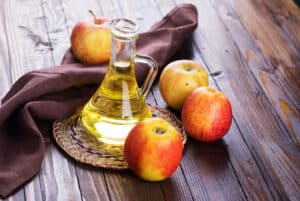
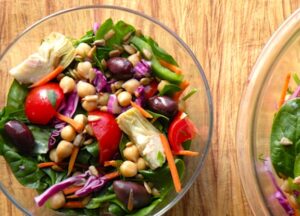
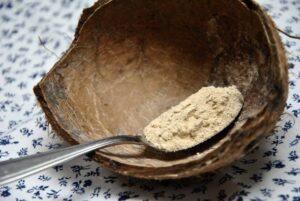
Sarah S says
this is my first time here and I just wanted to stop by and say Hello Everyone.
Sophie @ happyspinach says
I love nutritional yeast flakes! My favorite use for it is sprinkled on my salad, or as something extra to dip my veggie sticks in.
Emma says
I coat firm tofu in nutritional yeast before pan searing it to get a crispy, caramelized flavorful exterior.
Nava says
Emma, that's a great idea for a unique flavor. I would like to find out whether searing the nutritional yeast compromises any of its nutrition. Any thoughts on that?
Ss says
Is nutritional yeast safe to use if you have issues with Candida?
Nava says
That's a good question, Shelley, and one to which I don't know the answer. You might find more info on this on http://www.rickiheller.com as she is an expert on Candida.
Anonymous says
I'm having a hard time finding foods that contain sufficient protein to compensate for my vegetarian diet. I'm not sure about what foods contain the most protein. What are my options?
Nava says
It's a myth that it's hard to get enough protein on a plant-based diet. Studies have shown that vegetarians, even vegans, in the US, often consume even more than the RDA. Here's a detailed article on protein in plant-based diets: http://www.vegkitchen.com/nutrition/protein/
Angelika says
for those of you worrying about protein..DON'T
A vegan will get on the average..70grams of protein from veggies. Everyone is trying to make us afraid we are not getting enough. CHILL..
Our bodies actually know how to recycle protein too.
Iron..might be an issue( I was always iron low..meat based or not) and B-12. the rest if never a worry
🙂
A
Kendra says
As a fellow candida & IBS sufferer, I wanted to try and shed some light on the question SS asked regarding the safety of using nutritional yeast when you have these digestive issues, or have had them in the past.
I cannot speak for all nutritional yeast products, but I've currently been using one that is safe to use (and in fact, beneficial) with digestive issues like candida and IBS.
I suffered for years with the two, and severely so. I have been using a nutritional yeast (brand called Sari Foods) for the last couple of months now with no issues what so ever. In fact, I'm positive that my digestive system has improved since I began using the yeast! I was scared at first because candida issues are absolute misery, and it seems once you've had it, it's very easy for it to keep showing back up in your life, even if you've gotten rid of it before.
I hope this helps. To elaborate, the package of the nutritional yeast I've been using says the yeast is "de-activated" and that it "does not contain candida albicans." Therefore, no, it will not exacerbate or cause you to have candidiasis. However, that's only speaking for the Sari brand. I don't know about other brands.
I'd also like to note that fortified is not necessarily a "good" thing. I was under the impression that foods with "fortified" vitamins were great for us, but there's actually been some information show up that that may not be entirely true. Plus, it means the manufacturer has changed the natural structure of the food if they fortify it. The label on the nutritional yeast I use says it is NOT fortified. It's completely, 100% natural.
That might be helpful for some folks to know.
Just make sure that the brand you use specifically states that it contains no candida albicans and is "de-activated."
Oh, to anonymous up there in the comments section who asked about finding a good source of plant-based protein, I think that hemp is the highest plant-based protein, from what I've gathered. It's actually pretty high in protein, among many, many other wonderful nutrients and such, including omegas! I love the stuff. I've used hemp seeds, but also a hemp powder that contains fiber as well. I'm really fond of this one because it contains so much healthy "stuff." The only downfall is the price of it, for some of us. It's not easy to keep much of it on-hand for me as it's quite expensive, but definitely a great source of omegas and protein.
Oh, and regarding "searing" nutritional yeast, I do think that it may compromise its nutritional content. It seems like I read that if it's exposed to high heat during the manufacturing process, then it can lessen the nutritional profile. I also recall reading that the Sari Foods brand I got a couple months ago stated that they use the lowest heat possible for this very reason. That is why I say that I would think "searing" the nutritional yeast might affect that. If heat during the manufacturing process has an impact, then I'd assume cooking or "searing" it would too.
Well, I hope that answered some of the questions regarding nutritional yeast! I never even knew the stuff existed until a couple of months ago myself, and I quickly began cramming my brain full of as much info regarding the very interesting food as I could. I've also shared everything I've learned and experience since I began using it on my blog, if anyone is interested in an in-depth personal experience and info regarding health benefits and such.
Older gets Wiser says
Among other good vitamins and minerals, Nutritional Yeasts are very rich in Phosphorous so you need extra calcium to balance it out, or you leach calcium out of your bones. I learned this first hand as I ate it daily for several years and started to have major calcium depletion. Extra Calcium, Vitamin D and magnesium are essential to add to diet if you regularly consume yeast. Same goes for Wheat germ and for the non-vegetarians, Liver - they're all very high in phosphorous.
Irena says
Where can I purchaser Engevita Savoury Yeast Condiment With B12, 125g
Nutrional yeast with contains no candida albicans and is “de-activated.”
It has to be organic totally natural
I live Winston Salem NC
Thank You
Sari Foods says
Hi! Thank you for the Sari Foods love Kendra we are so pleased to have you in the Sari Foods club!
Our Non-fortified Nutritional Yeast is 100% natural and contains no synthetic nutrients. As you say, Most nutritional yeast products are fortified with excessive amounts of synthetic vitamins to increase the nutritional count. At Sari Foods, we believe that these man-made vitamins are not only unnecessary, but that they can be harmful and toxic to our bodies, causing nutrient imbalances and forcing our kidneys and liver to work overtime while our bodies struggle to absorb them. This goes against everything we stand for - so we decided to change things, making a nutritional yeast product that is 100% whole food based and naturally occurring - nothing synthetic here - just as nature intended!
In terms of plant based protein, our Non-fortified Nutritional Yeast is around 50% protein and we also sell Organic Spirulina which is 65% plant based protein (along with a multitude of other nutrients) - making it possibly the highest protein count of any natural food source!
All our products can be purchased through our website (with international shipping) or through Amazon US & UK.
If there are any further questions, please get in touch - We are always happy to help!
Tania says
Nutritional yeast can not produce b12. If it contains it then it is synthetic..:(